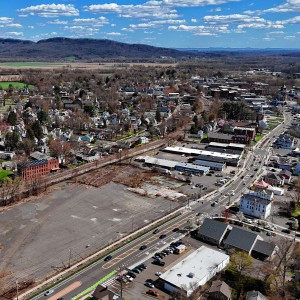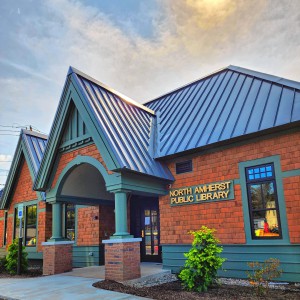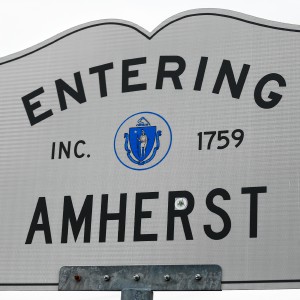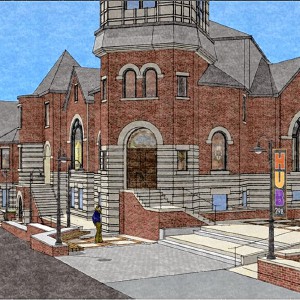Belchertown Select Board gives Saunders earful over state funding

Aaron Saunders, D-Belchertown, recently met with the Select Board for an hour to discuss state aid funding formulas and other issues affecting the town. Contributed photo
| Published: 04-11-2024 12:45 PM |
BELCHERTOWN — A week after the town’s school system laid off 17 staff members due to funding woes, the Select Board had a simple message for state Rep. Aaron Saunders during a recent meeting — help us.
Saunders, D-Belchertown, however, was not brimming with optimism during an hourlong meeting with the board on April 1 that the state would save the day anytime soon. The first-term legislator who represents Belchertown, Pelham, Shutesbury and other communities pointed out that state revenue is down and likely won’t bounce back for a couple of years, but he promised to continue to work on changing funding formulas for both school and transportation projects.
“I want you to know and the folks of Belchertown to know that making sure that we have adequate and equitable funding for our schools, for our town, for our roads and bridges is at the top of my list,” Saunders said.
Select Board Vice Chair Ron Aponte pointed out that Belchertown’s net state aid — a major piece of the town’s budget along with property taxes — has increased just 1% year-over-year for the last eight years, while inflation has gone up considerably more than that in recent years.
“Even at the best of times at 2%, we are losing ground,” Aponte said. “As a result, that (filling the gap) now falls on the local municipalities and Belchertown is not alone unfortunately.”
Without state aid increases matching inflation rates, Aponte said the municipality and school district must cut important positions and programs. With state aid formulas for roads and schools relying so much on population numbers, rural areas are taking a big financial hit, he said.
Saunders promised to advocate for the needs of rural communities, like a more equitable formula for capital improvement funding, but admitted that the state’s failure to hit revenue goals as federal pandemic relief funds came to an end means rural municipalities won’t see increases for the next couple years.
“The ugly is that for the last nine months, the commonwealth has missed its revenue benchmarks ... that is the first time since the Great Recession that we’ve gone that long,” he said, noting that the legalization of sports betting has reduced the amount money collected the State Lottery. Profits from lottery sales are distributed as unrestricted local aid to all cities and towns in the commonwealth.
Article continues after...
Yesterday's Most Read Articles
 Northampton bans auto dealerships near downtown; zone change won’t affect Volvo operation on King Street
Northampton bans auto dealerships near downtown; zone change won’t affect Volvo operation on King Street
 Proposed Hatfield pickleball/tennis building raising eyebrows
Proposed Hatfield pickleball/tennis building raising eyebrows
 South Hadley man killed in I-91 crash
South Hadley man killed in I-91 crash
 ‘Home away from home’: North Amherst Library officially dedicated, as anonymous donor of $1.7M revealed
‘Home away from home’: North Amherst Library officially dedicated, as anonymous donor of $1.7M revealed
 Police respond to alcohol-fueled incidents in Amherst
Police respond to alcohol-fueled incidents in Amherst
 Public gets a look at progress on Northampton Resilience Hub
Public gets a look at progress on Northampton Resilience Hub
Saunders, along with other representatives of rural districts, are fighting to change the Chapter 90 funding formula used to determine how much money cities and towns get for road improvements and other transportation-related projects. He would like to see the state put more weight on how many miles of roads are in each community instead of placing so much importance on population. The idea is not popular among officials from more larger cities.
“We try to remind colleagues that the work we do in the western Massachusetts so often is that we preserve the open space, the lungs of the commonwealth, and there needs to be some recognition of the value of that,” Saunders said.
When it comes to school funding, Saunders said rural districts will need to think creatively about how to handle a plateau in state school funds, now that pandemic federal relief money has expired for school spending. There is some money set aside for schools in the Legislature, but not enough to plan budgets around, he said.
Select Board members pressed Saunders on this point.
“If our schools are suffering, our students are suffering. If our students are suffering, then the people who will graduate from our schools and move into positions of leadership will not be prepared to do that,” said Select Board member Peg Louraine. “It’s so wrong, you should not need to have to point that out to your colleagues.”
Aponte points out that state aid increases lagged behind long before federal relief funds existed. He implored Saunders to push the state to look at diversifying revenue streams or revisit the Chapter 70 formula.
Aponte also suggested that Saunders advocate for reform or repeal of the state’s right to shelter law, which guarantees shelter to homeless families, and instead funnel that money to cities and towns that are making severe spending cuts.
Saunders strongly advocated for the law and it’s impact on families before lobbing the blame at the federal government’s immigration system and backed-up asylum court hearings. He does, however, point out that the state has struggled to issue work permits to these families, preventing them from making an income, adding to the tax base and leaving the shelters.
“We can’t leave these folks on the street,” he said. “Our responsibility is to be smart, efficient, creative, in making sure that the folks who do come to Mass. are in that system as short of amount of time has their need to be.”
Select Board Member Jen Turner and Town Administrator Steve Williams steered the conversation toward building repair. Despite the open space and agricultural assets of the town, the lack of grant funding and buildings for local businesses prevents the town driving economic development. Williams pointed out that the Massachusetts School Building Authority’s reimbursement rate for the town’s proposed $121 million Jabish Brooke Middle School is very low, putting two-thirds of the cost on the town.
“We are getting dangerously close to the point that these projects are not affordable for the communities, and if the MSBA needs to take on fewer projects per year to ensure that there’s adequate reimbursement, so be it,” Saunders said.
Saunders acknowledged the problems, but said that the MSBA reimbursement rate probably won’t change anytime soon, and the Belchertown State School is where funding for economic infrastructure is going.
Saunders left the Select Board with little options besides waiting for reform to come.
“The equity doesn’t exist, and that’s what missing somehow in the all arguments, the fact that all of us are citizens of Massachusetts and all of us need the same consideration,” Louraine said.
Emilee Klien can be reached at eklein@gazettenet.com.

 State Senate budget funds free community college for all
State Senate budget funds free community college for all ‘We can just be who we are’: Thousands show support for LGBTQ community at Hampshire Pride
‘We can just be who we are’: Thousands show support for LGBTQ community at Hampshire Pride Doors open at Tilton Library’s temporary home at South Deerfield Congregational Church
Doors open at Tilton Library’s temporary home at South Deerfield Congregational Church Area property deed transfers, May 2
Area property deed transfers, May 2
